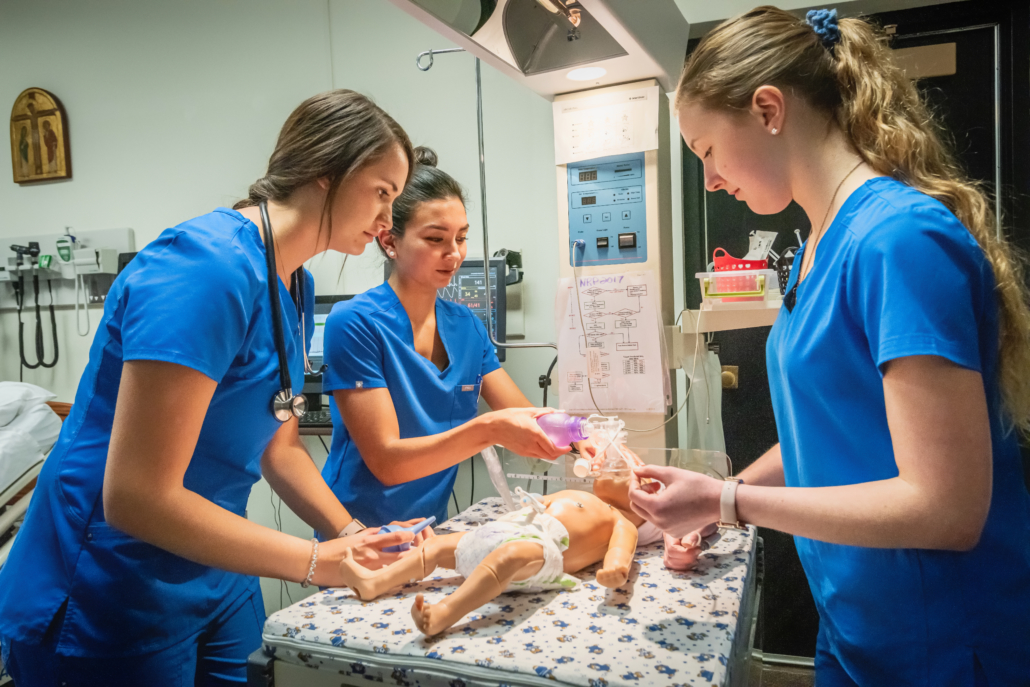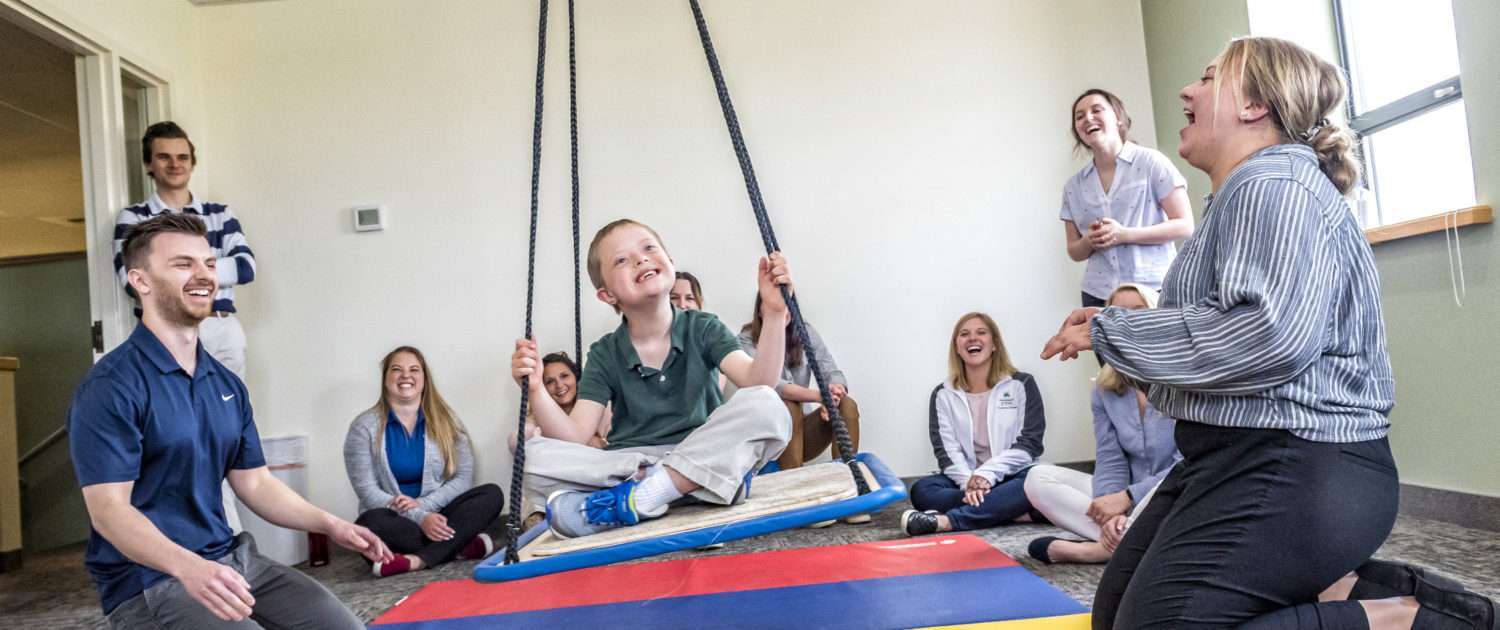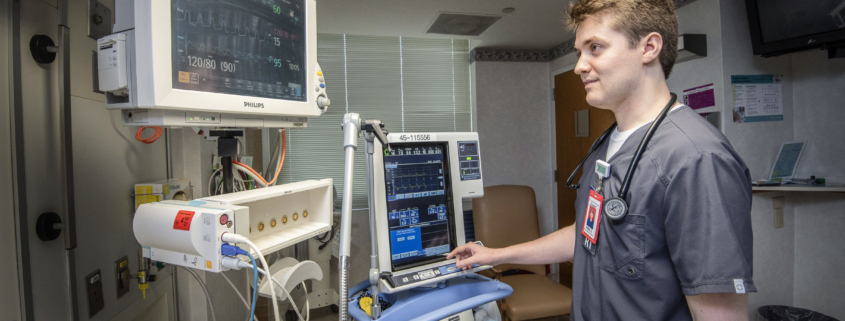University of Mary Embraces Health Sciences in ‘Mission of Service’
Where can Catholic families send their children who want to pursue a career in the health sciences? The University of Mary in Bismarck, N.D., which is recommended in The Newman Guide, is an exciting option.
The Newman Society recently asked Dr. Mary Dockter, dean of the Saint Gianna School of Health Sciences at the University of Mary, to discuss how students are taught about the moral dimension of their work.
Newman Society: The University of Mary has made an extraordinary commitment to programs in the health sciences. Why?
Dr. Mary Dockter: The University of Mary exists to serve the people of this region and beyond. This mission has its roots in the pioneering courage of our Sisters, who first came to Bismarck to serve the needs of the people here, opening up schools and the only hospital between St. Paul and Seattle. They came not simply to educate minds, but to offer desperately needed bodily care to the afflicted. Thus, our commitment to programs in the health sciences is extraordinary because health care is an integral part of our history and a cherished aspect of our identity, and it drives and inspires us to train health care professionals who carry on that mission of service and care for others.
At every point in our university’s history, health care education has led the way. The university’s first master’s degree was in nursing and the first doctoral degree was in physical therapy. Our nursing program is currently ranked #1 in the nation by nursing’s national benchmark service, Mountain Measurement. We also know, now more than ever, there is a need for talented health care providers who can practice within the bounds of Catholic social teaching, lead with moral courage and uphold respect for the dignity of every human person.
As our region has expanded, along with the needs of those we serve, so too have our program offerings. We offer many ways for our students to pursue fulfilling careers in health care, for undergraduate students, graduate students and professionals wanting to begin or advance a career in health care — like the RN to BSN, accelerated second degree BSN and multiple master’s and doctoral degrees. Our online LPN to BSN program is ranked #6 nationally; our Exercise Science program is ranked #15 among hundreds of accredited bachelor’s programs; our Respiratory Therapy program was awarded “The President’s Award for Excellence in Credentialing Success,” which is the Commission on Accreditation for Respiratory Care’s highest distinction.
We at the Saint Gianna School of Health Sciences have much to celebrate, but there is also more work to do.

Photo via the University of Mary.
Newman Society: As our culture secularizes, there are an increasing number of medical practices today that run contrary to the Catholic faith, including abortion, “sex reassignment” surgeries, etc. How are students in the Saint Gianna School of Health Sciences at the University of Mary taught about the moral dimension of their work?
Dr. Mary Dockter: We chose Saint Gianna as our patroness, not only because she led a life of faith as a physician, but precisely because she knew the value and worth of human life and the inherent dignity therein. We therefore strive to form our students with core components of Catholic social teaching in our health care education — from Ex corde Ecclesiae, informing our mission as a Catholic university, to the USCCB’s “Ethical and Religious Directives” and beyond. Our faculty lead discussions on the profound issues related to the beginning and end of life and guide students through how to consider dignity and respect are ensured for all people, especially given the complex ethical landscape of modern health care. We encourage our students to study bioethics at the University of Mary, in coordination with the National Catholic Bioethics Center, and offer not only a master’s degree but concentration and certificate options as well. Inspired and informed by the bioethics program, our students are formed with a focus on the multifaceted and ethical nature of providing health care.
By the time they leave our program, our graduates have a deep understanding of the integration of faith and reason as a foundational component of clinical reasoning and ethical decision making, all toward the end of safeguarding human dignity, and all while providing competent, excellent care.
Newman Society: Why is an academically excellent and faithfully Catholic education crucial for nurses, therapists, laboratory technologists, and other professions in the health sciences?
Dr. Mary Dockter: Academic excellence is crucial for ensuring patients receive quality care from their health care providers. Our program faculty guide our graduates to be the very best in their fields and prepare them to be exemplars of moral courage and defenders of the sanctity of life and dignity of the human person. Combining academic excellence within a faithfully Christian, joyfully Catholic and gratefully Benedictine community means that our graduates, who aspire to be virtuous leaders, can impact societal health in positive and lasting ways.
Moral courage is a great example of how these components come together in the Saint Gianna School of Health Sciences. In each of our programs, students become keenly aware why access to necessary treatments and therapies — especially for the poor, the marginalized and the underserved — is something we strive to ensure. We also ask our students to consider this question thoughtfully, “Just because we can do something in medical science, should we do it?” We acknowledge that health care professionals and their patients both have rights of conscience, meaning that we must approach ethical dilemmas with keen perception, personal fortitude and gracious understanding.
Students are often surprised at how engrained, multifactorial and complicated the moral dimension of providing health care is when they enter the workforce. Weaving these conversations into our classrooms and integrating principles of Catholic social teaching into our curricula are critical components of why our graduates have made such a profound impact on health care in today’s world.

Photo via the University of Mary.
Newman Society: Beyond course offerings, how will a student’s experience at the University of Mary help prepare them to defend the life and dignity of each human person?
Dr. Mary Dockter: Our students have many experiences outside of the classroom that prepare them to enter the workforce as health care providers with moral courage and defenders of the sanctity of life and dignity of the human person. Most of our health care students participate in local, regional and/or international service-learning trips and/or experiences. University of Mary students, whether studying health care or another field, can partake in a rich sacramental life on campus, with daily Mass, adoration and prayer. Likewise, our Christian, Catholic and Benedictine values are infused in every single class our students take, in the Saint Gianna School of Health Sciences, and in any one of our other four academic schools. Our students cultivate rich, lasting friendships, nurture the spiritual and moral development of the community and promote the university-wide culture of discernment, engagement and evangelization. As a campus community, we participate in Day of Service, March for Life, Prayer Day and Life and Dignity Week. In addition, the University of Mary has a Mission for Life Office dedicated to finding service opportunities for students.
As a student prepares to defend the life and dignity of each human person, our faculty play a large role in their formation. They are highly engaged with what it means to be Catholic health care providers and educators. Many of our faculty took the opportunity to attend the annual conference of the Catholic Medical Association meeting in September of this year. And before the pandemic, they traveled abroad on pilgrimage to bear witness to the suffering at the concentration camps of World War II and to the miracles of healing at the Sanctuary of Our Lady in Lourdes, France. This pilgrimage was part of an integrated mission to learn about the diversity of human experience, to form faculty more strongly in the Catholic faith and to reaffirm their commitment and understanding of the need to uphold the dignity of human life.
Simply put: every facet of our university works to support students in their path to becoming leaders in their fields and in their communities.
Newman Society: Anything else you’d like to add about your Saint Gianna School of Health Sciences?
Dr. Mary Dockter: We have a long-standing history of providing health care education, and there are some very exciting developments happening at our school. In addition to earning a health care degree, our health sciences students can complete coursework in Catholic Studies to complement their program of study. In addition to serving the needs of our current students, we offer an accelerated second degree BSN, as well as RN to BSN, LPN to BSN, and RT to BSRT degrees to help members of our community upskill their education and achieve the positions that are in high demand. For lifelong learners, we offer a plethora of master’s degrees and certificate options within our school, as well as throughout the university.
We recently commended our entire School of Health Sciences to the patronage of Saint Gianna Beretta Molla, an Italian pediatrician drawn to the care of mothers, babies, the elderly and the poor. Her commitment to the dignity of human life inspires us to achieve greatness in our daily life, committing at each step to uphold our Christian, Catholic and Benedictine values. We look forward to October 4, 2022 — the Saint’s 100th birthday — when we will officially rededicate the School of Health Sciences to the patronage of Saint Gianna Beretta Molla. During this time, we will thank God for this work that’s been specially given to us and reflect on the many ways our school can further impact the world of both Catholic and secular health care.

